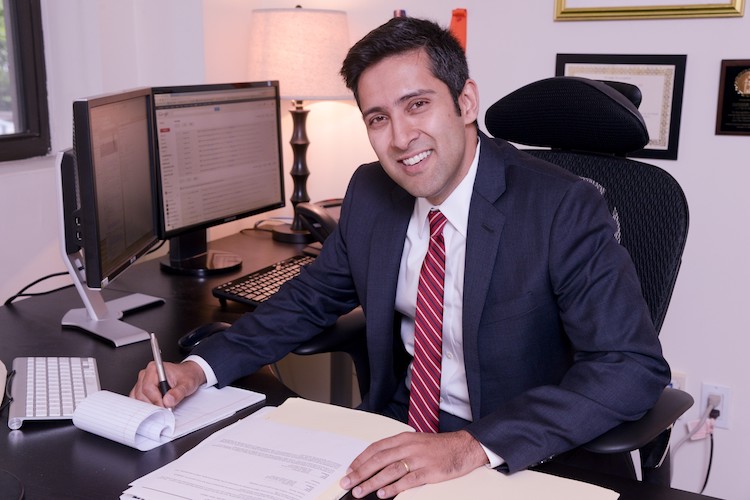Public interest attorney takes cue from Man of Steel, aspires to be super-lawyer
Sateesh Nori.
“Man is a rope, stretched between the beast and the Superman, a rope over an abyss.”
—Friedrich Nietzsche
Thus Spoke Zarathustra
As a public interest lawyer, I feel this tension every day. From the stoic sense of focusing on what is possible to the idealistic urge to remake the system, sometimes I feel paralyzed between what I can do for my clients and what I should do for them. I refocus my energy by reminding myself that I am an attorney, not a social worker, policymaker or judge. But the act of reframing my role sometimes leaves me frustrated and exhausted.
I work primarily on behalf of low-income tenants in New York City who are facing eviction. My clients are poor, often immigrants, and almost always facing a more powerful landlord in a city where powerful landlords often make many of the rules. Sometimes I can wield the law as a weapon to preserve the tenuous hold that my clients have on their homes. In many other cases, I am using the law to merely delay the inevitable eviction while holding on to the value of “due process”—which has no practical meaning for a family when a city marshal is at their door to evict. At the end of a long day or a long week, I’m often sitting alone with the question: Is this the way it has to be?
In The Clinic Effect, recent MacArthur Foundation “genius grant” awardee Rebecca Sandefur, who has dedicated her career to understanding the role of lawyers and the limitations of the structures of public interest law, wrote with Jeffrey Selbin, “During law school, students’ commitment to work for the public good is either crushed, or its meaning is changed to encompass more mainstream aspirations.” Law schools focus on fundamental skills through the case method but fail to teach law students about their civic duties and social responsibilities.
Why is the desire of many law students to work for the public interest crushed? Why don’t lawyers have a better understanding of their civic duties and social responsibilities? Obviously, law school debt and other financial burdens make pursuing a public interest career a great sacrifice. But are there other factors?
I think being a public interest lawyer brings with it an internal conflict between feeling powerless to make change and feeling the great responsibility for the outcomes of our cases. This is the central conflict of the comic book hero Superman: the split between Clark Kent and the man in the red cape.
In Action Comics No. 8 (January 1939), Superman takes on the issue of housing for the poor. He confronts a gang of youths in a slum and says: “It’s not entirely your fault that you’re delinquent; it’s these slums—your poor living conditions—if there was only some way to remedy it.”
Superman’s hope is that destroying the slums will force the government to build decent and affordable public housing. “When I finish, this town will be rid of filthy, crime-festering slums!”
It seems incredible that even Superman once tackled social justice issues. Also interesting is that his perceived solution to the issue of providing safe and decent housing for the poor was to completely and literally destroy the existing structures. In this tale, Superman is an outlaw, a vigilante. There is no Clark Kent to equivocate to find sensible solutions.
Many of us chose the law as a career to be someone else. Some may see law school as self-improvement through academic study: a path to a more confident, outspoken person. We chose public interest law to feel like outlaws: to question the fundamental sources of inequality and injustice. We toil as cogs in legal machines but also desire to dismantle them. We uphold the rule of law while questioning its foundations. We work within systems such as courts, corporations and governments while developing a deep knowledge of the flaws, cracks and hypocrisy within them.
Ultimately, there can be no skill or superpower under the law. There is no solution in a whirlwind of power and force. We must seek incremental change, one case at a time. And we must look beyond our limited and ill-defined roles as lawyers to seek solutions.
We are all honorable, bumbling, well-meaning (if not also socially awkward) Clark Kents. But we can and should dream of being super.
Sateesh Nori is the attorney-in-charge of the Queens neighborhood office of the Legal Aid Society in New York City. He is a board member of the access-to-justice startup Justfix.nyc and the nonprofit Housing Court Answers. He is a graduate of the New York University School of Law, where he is also an adjunct professor, and Johns Hopkins University.
ABAJournal.com is accepting queries for original, thoughtful, nonpromotional articles and commentary by unpaid contributors to run in the Your Voice section. Details and submission guidelines are posted at “Your Submissions, Your Voice.”
Your Voice submissions

The ABA Journal wants to host and facilitate conversations among lawyers about their profession. We are now accepting thoughtful, non-promotional articles and commentary by unpaid contributors.


